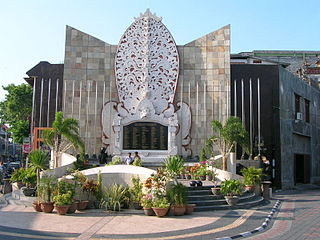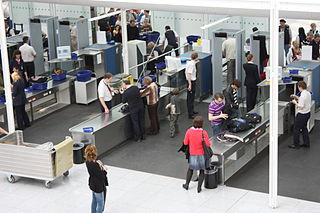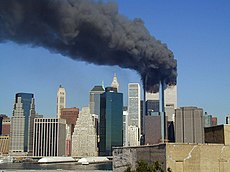Aims of the resolution
The resolution aimed to hinder terrorist groups in various ways. It recalled provisions from resolutions 1189 (1998), 1269 (1999) and 1368 (2001) concerning terrorism. UN member states were encouraged to share their intelligence on terrorist groups in order to assist in combating international terrorism. The resolution also calls on all states to adjust their national laws so that they can ratify all of the existing international conventions on terrorism. It stated that all States "should also ensure that terrorist acts are established as serious criminal offences in domestic laws and regulations and that the seriousness of such acts is duly reflected in sentences served." [1]
The resolution established the Security Council's Counter Terrorism Committee [CTC] to monitor state compliance with its provisions.
It also aimed at restricting immigration law, stating that "before granting refugee status, all States should take appropriate measures to ensure that the asylum seekers had not planned, facilitated or participated in terrorist acts. Further, States should ensure that refugee status was not abused by the perpetrators, organizers or facilitators of terrorist acts, and that claims of political motivation were not recognized as grounds for refusing requests for the extradition of alleged terrorists." [1]
However, the resolution failed to define 'terrorism', and the working group initially only added Al-Qaeda and the Taliban regime of Afghanistan on the sanctions list. This also entailed the possibility that authoritarian regimes could label even non-violent activities as terrorist acts, thus infringing upon basic human rights.

United Nations Security Council resolution 1566, adopted unanimously on 8 October 2004, after reaffirming resolutions 1267 (1999), 1373 (2001) and 1540 (2004), the Council condemned terrorism as a serious threat to peace and strengthened anti-terrorism legislation.
The ISIL (Da'esh) and Al-Qaida Sanctions Committee is a committee of the United Nations Security Council tasked with implementing international sanctions against the Islamic State and al-Qaeda. It was established as the Al-Qaida and Taliban Sanctions Committee on 15 October 1999, pursuant to Security Council Resolution 1267, which designated al-Qaeda and the Taliban as terrorist organizations. Following the creation of a separate Taliban Sanctions Committee on 17 June 2011, it was renamed the Al-Qaida Sanctions Committee. The scope of the sanctions regime was expanded to include the Islamic State on 17 December 2015 pursuant to Resolution 2253.
The Counter-Terrorism Committee is a subsidiary body of the United Nations Security Council.
United Nations Security Council resolution 1269, adopted unanimously on 19 October 1999, after expressing concern at the increasing number of acts of international terrorism, the Council condemned terrorist attacks and called upon states to fully implement anti-terrorist conventions. It was the first time the Security Council had addressed terrorism in a general manner, though it did not define what constituted terrorism.
United Nations Security Council Resolution 1377 was adopted unanimously at a ministerial meeting on 12 November 2001; the Council adopted a declaration concerning efforts to eliminate international terrorism.
United Nations Security Council resolution 1390, adopted unanimously on 16 January 2002, after recalling resolutions 1267 (1999), 1333 (2000), 1363 (2001), 1368 (2001), 1373 (2001) 1378 (2001) and 1383 (2001) concerning the situation in Afghanistan and terrorism, the Council imposed further sanctions on Osama bin Laden, Al-Qaeda, the Taliban and others associated with them.

United Nations Security Council Resolution 1438, adopted unanimously on 14 October 2002, after reaffirming the principles of the United Nations Charter and Resolution 1373 (2001), the Council condemned the bombings in Bali, Indonesia.

United Nations Security Council resolution 1450, adopted on 13 December 2002, after reaffirming the principles of the United Nations Charter and resolutions 1189 (1998), 1269 (1999), 1368 (2001) and 1373 (2001), the Council condemned the attacks on Israeli targets in Kikambala and Mombasa, Kenya on 28 November 2002.

United Nations Security Council resolution 1455, adopted unanimously on 17 January 2003, after recalling resolutions 1267 (1999), 1333 (2000), 1363 (2001), 1373 (2001), 1390 (2001) and 1452 (2002) concerning Al-Qaeda, the Taliban and terrorism, the council improved the implementation of measures against the groups. It was the first Security Council resolution adopted in 2003.
United Nations Security Council resolution 1456, adopted unanimously on 20 January 2003 in a meeting at the foreign minister level, the council adopted a declaration calling on all states to prevent and suppress all support for terrorism. The resolution did not define terrorism, but unlike other previous resolutions, mentioned human rights for the first time.
United Nations Security Council resolution 1526, adopted unanimously on 30 January 2004, after recalling resolutions 1267 (1999), 1333 (2000), 1363 (2001), 1373 (2001), 1390 (2001), 1452 (2002) and 1455 (2003) concerning terrorism, the council tightened sanctions against Al-Qaeda, the Taliban, Osama bin Laden and associated individuals and groups.
United Nations Security Council resolution 1535, adopted unanimously on 26 March 2004, after reaffirming resolutions 1373 (2001), 1377 (2001) and 1456 (2003), the council restructured the Counter-Terrorism Committee to enhance the implementation of anti-terrorism measures.

United Nations Security Council Resolution 1963, adopted unanimously on December 20, 2010, after reaffirming resolutions 1373 (2001), 1535 (2004), 1624 (2004), 1787 (2007) and 1805 (2008), the Council decided to continue the Counter-Terrorism Committee Executive Directorate (CTED) under the guidance of the Counter-Terrorism Committee (CTC) for another three years until December 31, 2013.

United Nations Security Council resolution 1617, adopted unanimously on 29 July 2005, after recalling resolutions 1267 (1999), 1333 (2000), 1363 (2001), 1373 (2001), 1390 (2001), 1452 (2002), 1455 (2003), 1526 (2004) and 1566 (2004) concerning terrorism, the Council renewed sanctions against Al-Qaeda, the Taliban, Osama bin Laden and associated individuals and groups for a further seventeen months.

United Nations Security Council resolution 1624, adopted unanimously at the 2005 World Summit on 14 September 2005, after reaffirming previous resolutions on terrorism, including resolutions 1267 (1999), 1373 (2001), 1535 (2004), 1540 (2004), 1566 (2004) and 1617 (2005), the Council called on all states to co-operate in order to strengthen the security of their international borders by enhancing terrorist screening and passenger security procedures.

United Nations Security Council Resolution 1989, adopted unanimously on June 17, 2011, after recalling resolutions 1267 (1999), 1333 (2000), 1363 (2001), 1373 (2001), 1390 (2002), 1452 (2002), 1455 (2003), 1526 (2004), 1566 (2004), 1617 (2005), 1624 (2005), 1699 (2006), 1730 (2006), 1735 (2006), 1822 (2008), 1904 (2009) and 1988 (2011) on terrorism and the threat to Afghanistan, the Council imposed separate sanctions regimes on Al-Qaeda and the Taliban.

United Nations Security Council Resolution 1735, adopted unanimously on December 22, 2006, after recalling resolutions 1267 (1999), 1333 (2000), 1363 (2001), 1373 (2001), 1390 (2001), 1452 (2002), 1455 (2003), 1526 (2004), 1566 (2004), 1617 (2005), 1624 (2005) and 1699 (2005) on terrorism, the Council approved measures to improve the identification and control of terrorists.

United Nations Security Council Resolution 2199 was unanimously approved on 12 February 2015 to combat terrorism. Drafted by Russia, its legally binding provisions gave the fifteen nations of the United Nations Security Council authority to enforce decisions with economic sanctions. The resolution, in particular, emphasized "the need to combat by all means, in accordance with the Charter of the United Nations and international law, [...] threats to international peace and security caused by terrorist acts".
The UN Counter-Terrorism Implementation Task Force (CTITF) was an instrument designed to roll out the UN Global Counter-Terrorism Strategy.

International sanctions against Afghanistan were implemented by the United Nations in November 1999. The sanctions were initially aimed at terrorists, Osama bin Laden and members of Al-Qaeda. The United States, the United Kingdom and the European Union also impose sanctions on Afghanistan.











